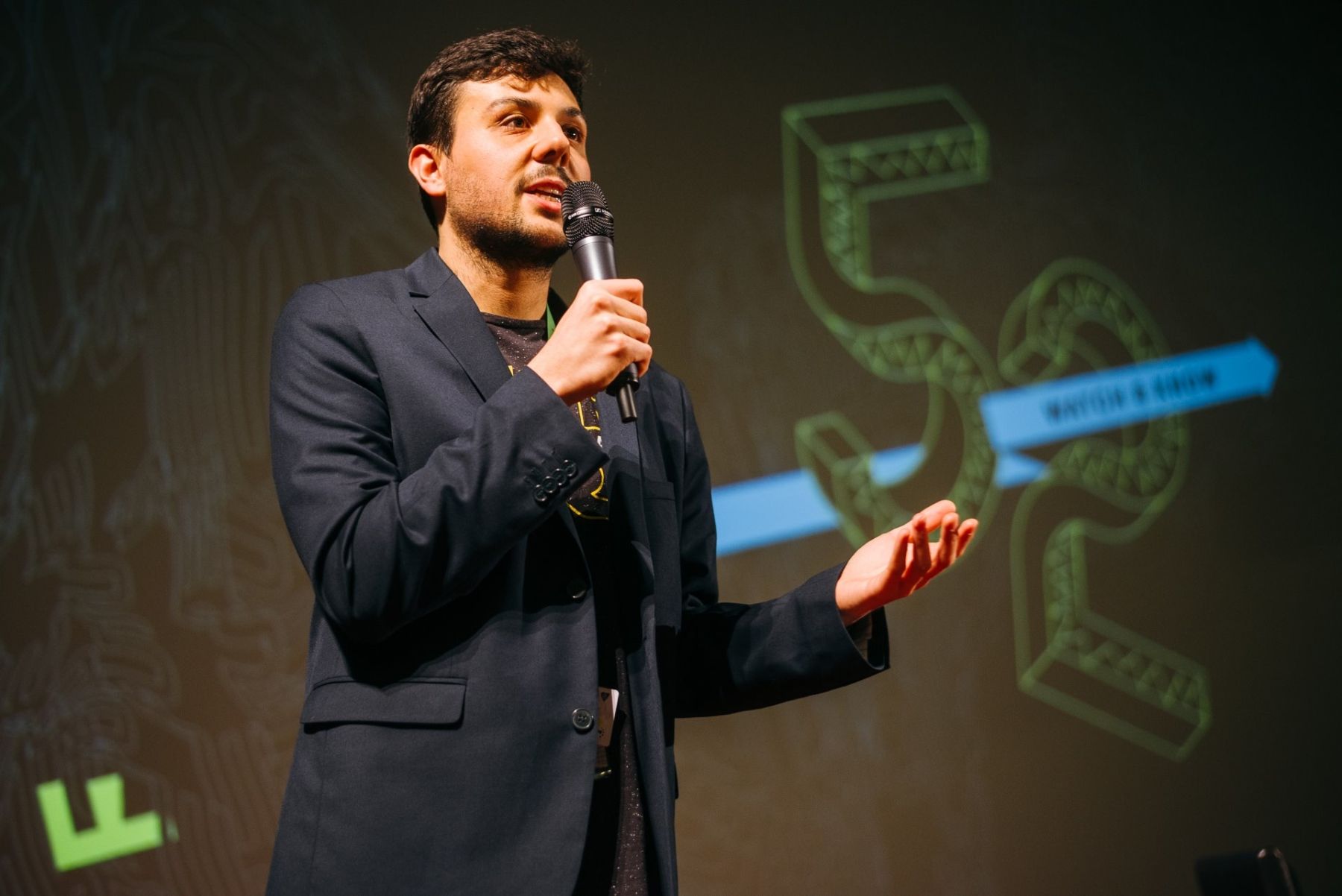
INTERVIEW: Science in Spotlight – documentary film as a mixture of western, action movie and comedy?
6. 12. 2018
A mixture of western, action movie and comedy – this is exactly the direction of the popular scientific film genre. We discussed its current trends and productions as well as the AFO programme compilation with Ondřej Kazík, the festival’s Head of Programming.
The majority of people think of documentary films in terms of “brainiacs” talking about the WWII or scenes of bears catching trout. How do the documentaries at AFO differ from the ones we’re used to seeing in television?
Every year, the AFO audience has the chance to see the most progressive popular science films. The top films work with a story, humour or suspense just like the most entertaining current blockbusters rather than simply staying on the level of conservative TV science documentaries. In addition, they often succeed in bringing even more quality information. We always try to take thematic and format variety in account when compiling the programme.
In recent decades, we’re witnessing a significant effect of the documentary film on TV production. Many genres seem to mix several genre features together. Therefore, the best works seek to grasp the audience’s attention as well as to communicate their content in the most efficient way. Every year, we receive thousands of film applications from which we then select the best ones; those that progressively present current topics from natural and social sciences as well as humanities. The competition can thus include both films working with radical artistic vision and seemingly conventional but formally perfectly mastered documentaries.
What distinguishes AFO from other film festivals is the fact that the international film competition presents films targeted for the television market, festival feature films for cinemas or series produced for digital platforms, all of which compete for the jury’s preferences.
The festival annually includes several competition sections. How are these different from other programme sections?
Unlike the programme sections, the competitions are not limited by a predefined theme. Therefore, we can offer our audience a wide range of documentaries. The competition sections are divided into three categories: international competition, short film competition and Czech & Slovak competition. The international competition introduces the most recent documentaries from productions all around the world. It also presents the newest trends, one of which is a platform for digital distribution and non-linear television.
While compiling the programme, we focus, among other things, on what is trendy in the given genre and current scientific research. What also distinguishes the competition from the non-competition programme sections is that we seek to show popularisation of science via audio-visual resources and inspire not only filmmakers but also current and future scientists. For example, in the short film competition, we often select such films which would not have been usually classified in the documentary film category. We evaluate them in terms of how clearly the filmmakers succeeded in expressing a seemingly complex idea and communicate it to the audience within a short format.
We also consider important the way how the films reflect science and how they describe and depict the lives of scientists. They turn them into superheroes or ordinary citizens who live their civilian lives and have experiences with which we can identify.
Who selects the documentaries for the competition sections?
The Programme Board consisting of a team of dramaturges chooses the documentaries for the programme sections. The programme team is currently comprised of teachers working at the Department of Theatre and Film Studies, its graduates and some of the current students. We are intensively searching for the competition films right after the previous AFO ends. We visit international festivals oriented on documentaries and communicate with our network of filmmakers and production as well as festivals and other dramaturges. From September, we intensely watch the submitted films which usually amount to couple thousands. We then gradually narrow the selection to a few hundred of the really essential ones recently created. Those are then being subjected to further examination.
Which criteria do the films have to meet?
Every year, there is a central topic which receives greater attention. However, we also try to present films introducing other issues to which, according to us, should be paid attention. One of the final aspects we look at is the way how the films communicate the topics to the audience. Our dramaturgical selection does not end simply with the selection of films; the jury’s choice is also important. We often try to find individuals among film professionals to join the jury. It also often consists of scientists who are esteemed guests of the festival. The winning film is then a compromise between the opinions of these two groups. Finally, we also greatly value the student jury consisting of representatives of the Palacký University faculties, members of which can be any full-time students. I would like to take this opportunity to call upon students, who would like to experience the festival from this prestigious perspective, to apply by writing to competition@afo.cz.
The most important of the festival awards is the Audience Award. AFO proudly considers itself as a festival with a faithful fan base. Each viewer can cast its vote regarding the competition films the viewer saw during the festival. Understandably, they primarily reflect the impressions imprinted by these films. But we do trust them as professionals who have seen several of such films each year.
The number of submitted films at AFO grows each year, how many were submitted last year, for example? Which country is the origin of the biggest number of films appealing for the attention of the festival’s dramaturges?
Last year, the number of submitted films exceeded 4,000. The number of films is increasing due to several factors. In the last decade, AFO has received an international reputation as a major festival which is unique by its connection with the university, the charm of Olomouc and more than 50 years of tradition. In addition, we launched an international web platform for the submissions a few years ago, so even filmmakers from East Asia or South America find their way to AFO. Every year, we receive a great number of films from France, Germany, the United Kingdom or Scandinavia; from the productions outside Europe, the ones in Canada, USA and Australia are strong and experienced.
If you draw a comparison in the popular science documentary field in the Czech Republic and in Europe or USA, how is the domestic production standing?
I am optimistic in this respect. I believe that the current Czech popular science films have progressed substantially at least in the last six years. Quality popular science series were created, such as Člověk, to je věda from the Czech Television, but also films, e.g. Planeta Česko, Svět podle termitů or Archa světel a stínu. The film by Petr Salaba which won this year shows that young filmmakers shift the popular science film genre further and further.
In addition, we also support the so-called industry programmes. In Camp 4Science, we allow filmmakers from the Czech Republic and abroad to submit their unfinished projects to AFO and consult international professionals during the full-day workshops. Our goal is to actively contribute to improving and advancing the genre in both domestic and international environment.
I would wish for the future Czech popular science films to be even more interconnected with the scientific community and universities. This could allow the current and important research, which, for example, takes place at the Palacký University, to reach the mainstream film production. That is why I see AFO as a fundamental platform for getting together and creating a relationship between the film industry and science.
The popular science documentaries have increasingly used narrative strategies of actors’ film. Have you ever been drawn into the story of an AFO film on the same level as, e.g. Star Wars?
Definitely, and it happens every year. Whether during the selection of films or during the festival itself when I can enjoy all the films at the big screen for a while. The documentary film strategies are really moving forward. I really appreciate the trend of identifying compelling stories with which the audience can identify but which, at the same time, calls for an active attitude or even change in one’s habits or behaviour.
It is no exception that audience gets involved in various campaigns based on these films. In this respect, I was really moved by films, such as Racing Extinction showing alarming facts about species extinction or Plastic Ocean directed by Craig Leeson. Leeson came personally to AFO to introduce the movie as well as his efforts in reducing the global use of plastics.
The films introducing the lives of famous scientists are also quite fascinating; they basically show them as superheroes whose work not only changes the history of their scientific fields but also inspired millions of other followers. For example, Jane Goodall in Jane is portrayed as a sensitive and wise woman as well as a brave scientist who was not afraid of sacrificing a whole lot for her research and the mission to protect the primates.
After all, wild-life documentaries, i.e. films depicting wild fauna and flora, have shown the lives of wild animals in recent years as a genre mixture of a western, action movie and even comedy which then tells us more about our own selves and our role on this planet than about the mysteries of nature. It’s exactly those stories with which we wish to continue to provide our audiences. For we believe that to watch & know is more important than anything else.
Author: Robert Jaworek
Editor: Nikol Láryšová
Academia Film Olomouc
28. – 3. 5. 2026
61ST INTERNATIONAL FESTIVAL OF SCIENCE DOCUMENTARY FILMS
Follow our social sites and explore our web to find out more about the programme. We will supply you with science dose by dose until the climax comes – AFO61.
Contact
Arts Centre of Palacký University
Academia Film Olomouc
Univerzitní 225/3
779 00 Olomouc
Czech Republic
afo@afo.cz
Quick links
Copyright © AFO 2000-2025 | web rostanetek.cz | admin







